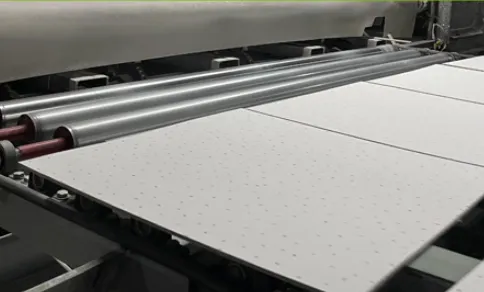Dec . 05, 2024 18:56 Back to list
Installation Guide for Suspension Ceiling Grid T-Boxes and Accessories
Understanding the T-Box for Suspended Ceiling Grids A Comprehensive Guide
Suspended ceilings, also known as drop ceilings or false ceilings, are widely used in commercial and residential spaces for various reasons, including aesthetic appeal, acoustic control, and practicality. One crucial element in the installation of suspended ceiling grids is the T-box, an integral component that facilitates the structural integrity and functionality of the ceiling. This article will explore the T-box's significance, design, installation, and benefits in the context of suspended ceiling grids.
What is a T-Box?
A T-box, often referred to as a T-bar or T-grid connector, is a specially designed connector that interlocks with suspended ceiling grid systems. These grids typically comprise a series of metal channels that form a configuration resembling a T, hence the name. The T-box plays a crucial role in connecting the main runners (the horizontal sections) to the cross tees (the vertical sections), thus ensuring that the ceiling remains stable and secure.
Design and Structure
T-boxes are typically made from galvanized steel or aluminum, providing durability and resistance to corrosion. Their design allows for easy installation and adjustment, which is essential in achieving a level ceiling surface. The T-box's engineering ensures that each grid connection can withstand the weight of ceiling tiles and any additional fixtures such as lights or ducts that are often added to the suspended ceiling.
The dimensions of a T-box are standardized to fit with industry-standard grid systems, which are commonly available in either 15/16 inch or 1 inch sizes. This compatibility simplifies the installation process and makes it easier for contractors to source materials.
Installation Process
Installing T-boxes within a suspended ceiling grid is a straightforward process, although it requires precision and correctness to ensure that the ceiling is properly supported. Here’s a step-by-step guide to the installation process
1. Prepare the Space Before installing the T-boxes, the area should be prepared by measuring and marking the ceiling’s layout. A level is necessary at this stage to ensure that the grid will be flat.
2. Install Main Runners The main runners are typically installed first. They are suspended from the actual ceiling using wires or hangers, spaced at regular intervals depending on the ceiling design.
t box for suspended ceiling grids

3. Add T-Boxes Once the main runners are secure, T-boxes can be inserted where main runners and cross tees intersect. Each T-box should snap into place firmly to provide a solid connection.
5. Secure the Ceiling Tiles Once the grid is fully installed, ceiling tiles can be inserted into the grid. The T-box provides the necessary support to ensure that tiles remain securely in place.
Benefits of Using T-Boxes
The use of T-boxes in suspended ceiling grids brings numerous advantages
- Stability and Support T-boxes provide essential stability, ensuring that the entire ceiling structure remains intact even under load.
- Ease of Installation Their design allows for quick and straightforward assembly, reducing labor time and costs for contractors.
- Flexibility T-boxes accommodate various ceiling configurations and can be adjusted easily if changes to the layout are required.
- Aesthetic Appeal By providing a uniform structure, T-boxes help create a clean and professional look for any space, enhancing the overall aesthetics.
Conclusion
In conclusion, T-boxes are a vital component of suspended ceiling grids, providing structural support, ease of installation, and aesthetic benefits. Whether in commercial buildings, office spaces, or homes, understanding and utilizing T-boxes can greatly enhance the quality and appearance of suspended ceilings, making them a preferred choice for many builders and designers. As technology advances, continued innovation in the design and functionality of T-boxes will likely lead to even greater efficiency and versatility in ceiling installations.
-
Quality Ceiling Trap Doors & Access Panels | Easy & Secure AccessNewsAug.30,2025
-
Durable Ceiling T Grid Systems | Easy InstallationNewsAug.29,2025
-
PVC Gypsum Ceiling: Durable, Laminated Tiles for Modern SpacesNewsAug.28,2025
-
Pvc Gypsum Ceiling Is DurableNewsAug.21,2025
-
Mineral Fiber Board Is DurableNewsAug.21,2025
-
Ceiling Tile Clip Reusable DesignNewsAug.21,2025







